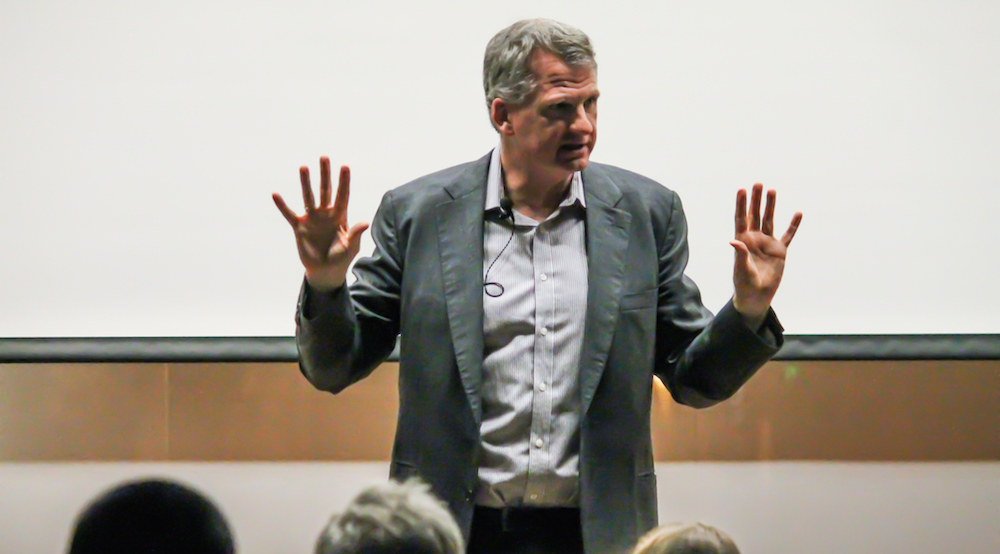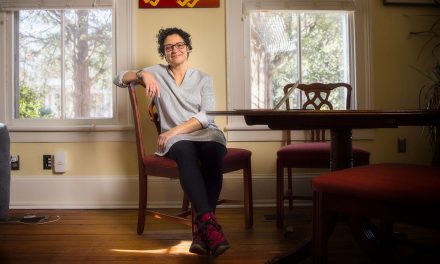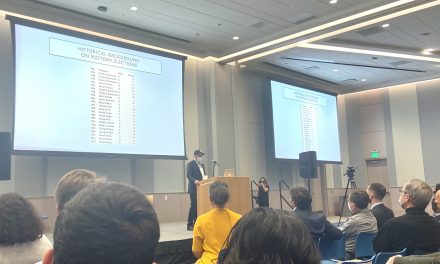
Timothy Snyder, the Yale University Bird White Housum Professor of History, delivers a lecture on the political history of the holocaust in the Oxford Presentation Room. Photo by Melissa DeFrank/ Staff
“How do you get from the idea that a certain group of people shouldn’t exist, to actually carrying out the policy?”
This was the main question discussed by Timothy Snyder, the Bird White Housum Professor of History at Yale University, in his lecture “The Holocaust as a Political History,” delivered last evening at the Oxford Presentation Room in the Oxford Road Building and followed by a 30-minute Q&A session.
The event was sponsored, among others, by the Tam Institute for Jewish Studies, the Halle Institute for Global Learning, Emory’s Institute of the Liberal Arts and the Jean Monnet Centre of Excellence at Georgia Institute of Technology.
Snyder, who specializes in the history of the Holocaust and the history of Central and Eastern Europe, discussed the importance of Hitler’s political ideology in causing the Holocaust, a state-sponsored attempt at ethnic cleansing that claimed the lives of more than 11 million people, the majority of whom were Jewish Europeans.
“There’s something between ideas and action, and that is politics,” Snyder argued. “It begins and ends with ideology.”
Snyder’s most recent book is a 2010 publication entitled Bloodlands: Europe Between Hitler and Stalin, which focuses on how 14 million non-combatants were killed in Eastern Europe by either Hitler’s or Stalin’s armies, was translated into over 20 languages. His upcoming book will focus on the causes of systematic murder in the Holocaust.
Snyder listed several political factors contributing to the Holocaust.
Snyder discussed Hitler’s writings in his autobiographical work, Mein Kampf, and how he used Christian ideals of struggles for ‘daily bread’ and transferred this to his own ideas of a struggle between the races for survival.
The lecture also covered Hitler’s ideas of lebensraum as having the dual meaning of habitat and comfortable living space, and how this contributed to Hitler’s ideas about the racial struggle. According to Snyder, Hitler used settlers in the United States, and how they slaughtered Native Americans and enslaved the African Americans, as his key example of a successful racial struggle.
According to Snyder, it was this vision which caused Hitler’s political aim of expanding territorially to create a racially homogenous ruling class which would enjoy lebensraum, or a comfortable living space.
Snyder also discussed the influence of Judeo-Bolshevism, a school of political thought which believes Jews are part of a Communist conspiracy theory, on Hitler’s foreign policy aims.
“Judeo-Bolshevism believes that Communists are Jews, and Jews are Communists,” Snyder explained.
He argued that Hitler used this political myth to use Jews as scapegoats for the fallen states of the countries that he invaded. According to Snyder, he also used this myth to blame the failure of states to fall on a successful Jewish conspiracy.
College junior Wrenica Archibald attended the lecture because she is currently taking a class on the history of the Holocaust, creating her interest in the topic. She found Snyder’s discussion of Hitler’s use of religious ideas most intriguing.
“The most interesting part was when he discussed how Hitler pulled from religious ideas of original sin,” Archibald said. “What I’ve learned changed my view of Hitler, and I now have a better understanding.”
Sarah Hesse, a College sophomore, attended because she was interested to learn more on the topic.
“His argument was different and offered another perspective,” Hesse said. “It was like a kind of awakening to see something you already knew in an all new way. It shows that you never know the answer to everything.”
— By Emily Lim, Staff Writer





